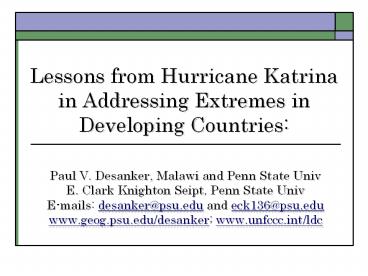Lessons from Hurricane Katrina in Addressing Extremes in Developing Countries: - PowerPoint PPT Presentation
1 / 11
Title:
Lessons from Hurricane Katrina in Addressing Extremes in Developing Countries:
Description:
Lessons from Hurricane Katrina in Addressing Extremes in Developing Countries: Paul V. Desanker, Malawi and Penn State Univ E. Clark Knighton Seipt, Penn State Univ – PowerPoint PPT presentation
Number of Views:150
Avg rating:3.0/5.0
Title: Lessons from Hurricane Katrina in Addressing Extremes in Developing Countries:
1
Lessons from Hurricane Katrina in Addressing
Extremes in Developing Countries
- Paul V. Desanker, Malawi and Penn State Univ
- E. Clark Knighton Seipt, Penn State Univ
- E-mails desanker_at_psu.edu and eck136_at_psu.edu
- www.geog.psu.edu/desanker www.unfccc.int/ldc
2
Introduction
- Extreme events such as floods, droughts, storms
on the increase world wide
http//www.nasa.gov/vision/earth/lookingatearth/h2
005_katrina.html
3
Mozambique
- Mozambique floods of 2000
- Limited tracking ability and warning, most rural
people unaware - 700 people dead, 500,000 displaced, 2 million
affected - Major impact on economy
- Trigger for action to address urgent and
immediate needs in LDCs, and the evolution of the
LDC National Adaptation Plan of Action (NAPA)
After
Before
4
Katrina in the US
- Hurricane Katrina in the US
- Brief history Category 4 hurricane, tracked for
several days, evacuation orders given, scenarios
of similar category storm existed, system in
place to respond from local government to state
and federal government
5
Katrina in the US
- Hurricane Katrina in the US
- Several hundred dead, millions displaced
- Many situations similar to Mozambique in terms of
who most at risk, survival strategies and other
factors associated with disasters
6
Determinants of Vulnerability
- Physical exposure to the hazard in the path of
destruction, flood plains - Status of ecosystem buffers e.g. wetlands land
subsidence - Socio-economic factors the poor had limited
ability to evacuate or do anything - Level of awareness function of level of
education and networks to communicate information - Complexities of institutional response
- The poor, young, elderly and the sick especially
vulnerable
7
Lessons learned and recommendations for
developing countries
- Importance of early warning systems but these
need to reach all stakeholders and should be
adequately integrated into normal operations - Awareness about the risks to take informed
decisions about personal response actions - Important role of pre-planning such as through
scenarios and drills New Orleans had
participated in scenarios of a major storm to
explore possible extent of damage and to plan
evacuation - Need for contingency planning, active generation
of solutions - Most disasters are complex, often with dimensions
no one could have foreseen
8
Coping Solutions
- Coping solutions assembled in the LDC Expert
Group database on local coping - Official launch Monday Dec 5th, LEG Side Event at
1-3 pm - Will be available online at www.unfccc.int/ldc
9
(No Transcript)
10
(No Transcript)
11
For more information
- LDC and LDC Expert Group Work Programme at
www.unfccc.int/ldc - Assessment of Mozambique Floods and Katrina
visit Malawi booth in the Exhibits Hall































